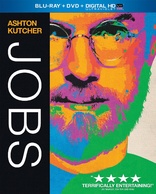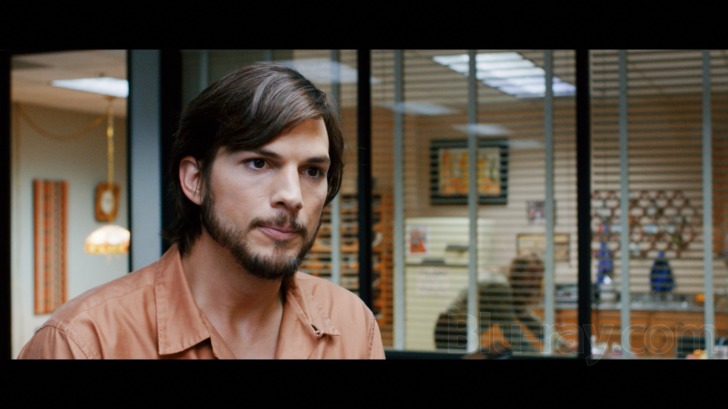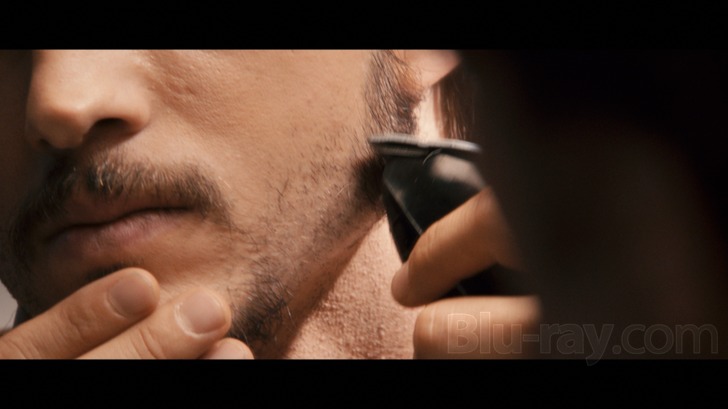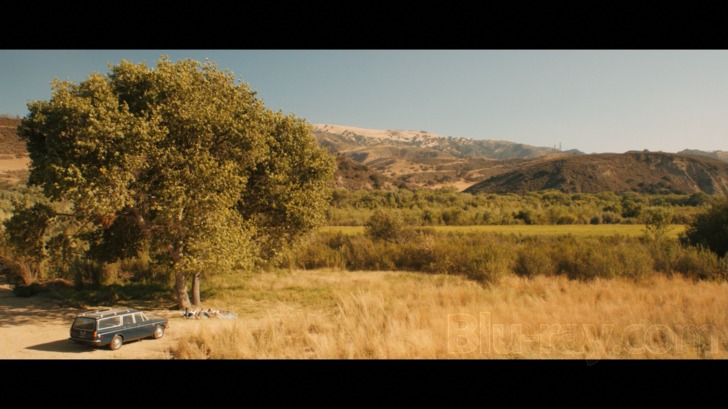Jobs Blu-ray Movie
HomeJobs Blu-ray Movie 
Blu-ray + DVD + UV Digital CopyUniversal Studios | 2013 | 128 min | Rated PG-13 | Nov 26, 2013

Movie rating
5.9 | / 10 |
Blu-ray rating
| Users | 4.0 | |
| Reviewer | 2.5 | |
| Overall | 3.5 |
Overview
Jobs (2013)
The story of Steve Jobs' ascension from college dropout into one of the most revered creative entrepreneurs of the 20th century.
Starring: Ashton Kutcher, Dermot Mulroney, Josh Gad, Lukas Haas, Matthew ModineDirector: Joshua Michael Stern
| Biography | 100% |
| Drama | Insignificant |
Specifications
Video
Video codec: VC-1
Video resolution: 1080p
Aspect ratio: 2.35:1
Original aspect ratio: 2.39:1
Audio
English: DTS-HD Master Audio 5.1
Subtitles
English SDH, French, Spanish
Discs
50GB Blu-ray Disc
Two-disc set (1 BD, 1 DVD)
UV digital copy
DVD copy
Packaging
Slipcover in original pressing
Playback
Region free
Review
Rating summary
| Movie | 2.0 | |
| Video | 4.0 | |
| Audio | 4.0 | |
| Extras | 3.0 | |
| Overall | 2.5 |
Jobs Blu-ray Movie Review
Does not compute.
Reviewed by Jeffrey Kauffman December 13, 2013Have you ever been guilty of rolling your eyes when some elderly person starts talking about how much the world has changed during their lifetime? I must admit I have succumbed to that trait, but I’m old enough now that I’ve actually experienced sea changes in the ebb and flow of daily life. It wasn’t so long ago that there wasn’t even an internet, and I can clearly recall my first dial up experience in the early days of the medium, with that grating noise which ultimately gave way to a quick sine wave before “contact” was established. But experiencing the internet of course required having a computer, and I am also old enough to remember a time before computers—or at least personal computers. I was managing an employment agency as memory typewriters gave way first to dedicated word processors (like the wonderfully named Wang) and then, finally, to those first clunky PCs, each governed by their own particular disk operating systems, which then had to be loaded with then very basic softwares like WordPerfect or AppleWriter. People were freaking out about these changes, and not always in a good way. Secretaries had become used to the tippy-tap of a typewriter, not to mention carriage returns with that unmistakable bell tone, and the so-called “convenience” of computers with software was a brave new world that many of them most assuredly did not want to navigate. Back in those “Dark Ages” people were too concerned with learning about the newfangled technology to care much about who had invented it, and in fact it wasn’t until I decided to go back to school part time (as I continued to work) and was studying for my Masters Degree at Portland’s Reed College that I first even heard of Steve Jobs, and then only because he had been a fellow alum. Reed’s environment is extremely eclectic, to say the least. For example, when I was working on my Masters there, I was given pretty much free rein to do whatever I wanted, and in short order I studied William Butler Yeats with a renowned Yeats scholar, took an invigorating course in Classical Greek from a wonderful English man with the superb name of Professor Peachy, and then scored the Drama Department’s production of William Inge’s Picnic. Steve Jobs felt a similar freedom about Reed’s intellectual environment but he simply could not afford the place. But everything that happened to Jobs after Reed College may be traced—at least tangentially, and I would argue much more directly than merely tangentially—back to his formative experiences at the tony liberal arts mecca of the Pacific Northwest, a place where curiosity is the drug of choice (well, one of the drugs of choice, anyway, as Jobs himself found out).

Jobs unfortunately is almost maddeningly inept in its depiction of one of the most epochal creative geniuses of our age. The film opens with the top secret Apple unveiling of the iPod, and the film seems almost desperate to lionize Steve Jobs (Ashton Kutcher) with a cloyingly heroic underscore that somehow supposedly invests a corporate announcement scene with underpinnings that the Second Coming is soon at hand (it struck me as inherently ironic that the Blu-ray features the score in a lossless format while Jobs is on the screen touting the incredible “wonders” of heavily compressed MP3 audio). When Jobs catches a reflection of himself in the glittering façade of the prototype iPod, we are then thrust back through the high tech windmills of his mind as Jobs goes back to some major formative moments with Jobs as a young student at Reed.
The story then moves directly to Jobs' relatively brief time at Reed (though the college shown in the film is most definitely not Reed, which is actually fairly small and contained), giving a cursory tip of the cap (and gown—which Jobs never received, by the way) to the college’s vaunted curriculum and its support of intellectually ambitious students (James Woods briefly appears as an oh-so-concerned Dean who of course knows Steve by his first name and isn't at all concerned that the kid is still sitting in classes despite not having paid tuition). But the film almost immediately reveals a trait that will ail it for the rest of its running time —we’re shown the “what” and “wherefore”, but almost never the “why”, and even the basic facts are dealt with in sometimes ridiculously lazy shorthand. Why, for example, is Steve drawn to things like calligraphy and fonts (something that will perhaps strangely play a part in his tumultuous reign at Apple)?
The film coasts through events in Jobs’ life, but doesn’t seem to want to scratch the surface and really examine motivations or psychology underpinning them. When there are passing attempts to get beneath Jobs' skin, they're oftentimes laughable. Jobs and two of his friends drop acid and then experience the oneness of nature out in a field, and suddenly Jobs is lamenting his fate as an adopted child. That moment of supposed emotionalism then gives way to an inherently ridiculous montage with Jobs (supposedly still high on LSD) dancing through a field of wheat while we see his spiritual awakening in India.
And then suddenly we’re in the world of high tech—at least if you can call Atari high tech (sorry, couldn’t resist). Jobs has found his niche, except that he’s alienating all of his coworkers. And so of course his boss gives him the chance to work by himself on a project, and just as suddenly Steve Wozniak (Josh Gad) is there, helping to solder circuit boards and saving his friend’s butt. This film often plays like a not very well written CliffsNotes rendition of Jobs’ life, where people (and events) come and go, but there’s absolutely no (or to be charitable, very little) context given, and things just kind of occur.
What would seem to be the prime drama of Jobs’ life—the creation of Apple and then the corporate skullduggery that (in Jobs’ words in the film) “stole” his dream from him—is again just kind of plastered up there on the screen without any compelling emotional underpinning. It’s fascinating to contrast Jobs with another recent film dealing with the world of high tech, The Social Network. The David Fincher film didn’t even deal with inventors of Jobs’ mystique (however you may feel about Facebook, it’s obviously not on the same level as the entire gamut of Apple’s accomplishments), and yet it was viscerally exciting and even moving at times. Jobs by contrast is like a list rather than a full bodied depiction of one of the rarest geniuses of the past half century.
Kutcher actually does a creditable job as Steve, though he has an odd “Actor’s Studio” tic of averting eye contact throughout the film that he evidently seems to have decided perfectly summed up Jobs’ kind of antisocial demeanor. And the large and colorful supporting cast, which includes people like Matthew Modine, Lesley Ann Warren and Lukas Haas, does what they can with characters that are never fully formed, seemingly by design. The main fault of this film is a really sloppy screenplay by Matt Whiteley, a new scenarist who seems to think merely trekking through the “greatest hits” of a life is enough to make a worthwhile film. There may be another Jobs biopic on the horizon, this one with Steve Wozniak’s participation (Wozniak was curtly dismissive of this particular effort, which Kutcher ascribed to his involvement with the second project). Maybe that film can finally provide a little insight into Jobs’ operating system.
Jobs Blu-ray Movie, Video Quality 

Jobs is presented on Blu-ray courtesy of Universal Studios with an VC-1 encoded 1080p transfer in 2.35:1. This Arri Alexa shot feature is sometimes curiously bland looking, with a lot of scenes tweaked in post so that they have a slightly orange-amber tint. The film was lensed mostly by Russell Carpenter (Aseem Bajaj did the location work in India which is quite briefly featured), and while the native HD image has the requisite sleekness and clarity we've all come to expect from the format, there's just a lack of real pop throughout this film that is rather surprising, given not only its high tech subject matter but also Jobs' own focus (as even stated in the film) on aesthetic beauty. A lot of this can be traced to kind of boring looking sets, many of which are almost monochromatic. A few notable exceptions come to mind, notably a lot of outdoor sequences, where finally the palette is somewhat more varied and perhaps therefore more immediately interesting. A few isolated scenes have been intentionally altered to supposedly provide some textural differences (see screenshot 6), though the wisdom of this approach is debatable. The transfer offers quite good fine detail (see screenshot 3), and a lot of the exterior footage has nice depth of field (see screenshot 14). Contrast and black levels are strong and there are no compression artifacts of any note.
Jobs Blu-ray Movie, Audio Quality 

Jobs' lossless DTS-HD Master Audio 5.1 is a fine sounding but not overly immersive track, one that really only springs to life when the copious source cues come into play (including some by one Steven Georgiou in his guises as Cat Stevens and Yusuf Islam). There are occasional good moments of discrete directionality in crowded dialogue scenes and in some outdoor scenes where ambient environmental effects enter the mix, but this is a fairly front heavy mix. Fidelity is excellent and there is no damage to report.
Jobs Blu-ray Movie, Special Features and Extras 

- Deleted Scenes (1080p; 3:31)
- Ashton Kutcher is Steve Jobs (1080p; 2:28). The fact that the title of this piece includes an italicized "is" tells you everything you need to know about it.
- The Legacy of Steve Jobs (1080p; 2:47). Yes, a man who changed the world and his legacy can be summed up in 2:47. Of course, the filmmakers couldn't do it in 2:08:14, either.
- Jobs: Behind the Score (1080p; 3:27) profiles composer John Debney.
- Feature Commentary with Director Joshua Michael Stern. Stern is actually fairly consistently interesting throughout this piece, and helps to fill in some of the motivations the screenplay lacks. He's a little low key, and kind of halting in his speech style, but he imparts quite a bit of good information here.
Jobs Blu-ray Movie, Overall Score and Recommendation 

There's definitely a film to be made about the incredible life and achievements of Steve Jobs, but Jobs ironically crams too much data into this offering while never penetrating much beyond a mere laundry list of people and events. The technical merits of this Blu-ray are fine, and the commentary is actually rather well done, so fans of the film will not be disappointed if they choose to add this to their collection.
Similar titles
Similar titles you might also like

The Internship
2013

Steve Jobs
2015

The Social Network
Collector's Edition
2010

Professor Marston and the Wonder Women
2017

The Front Runner
2018

Gotti
2018

Girls Trip
2017

The Blind Side
2009

Larry Crowne
2011

El Cantante
2006

The Pursuit of Happyness
2006

A Madea Christmas
2013

Shattered Glass
2003

Freedom Writers
2007

Tolkien
2019

The Man Who Knew Infinity
2015

Million Dollar Arm
2014

Bohemian Rhapsody
2018

The Fifth Estate
2013

Miss Potter
2006